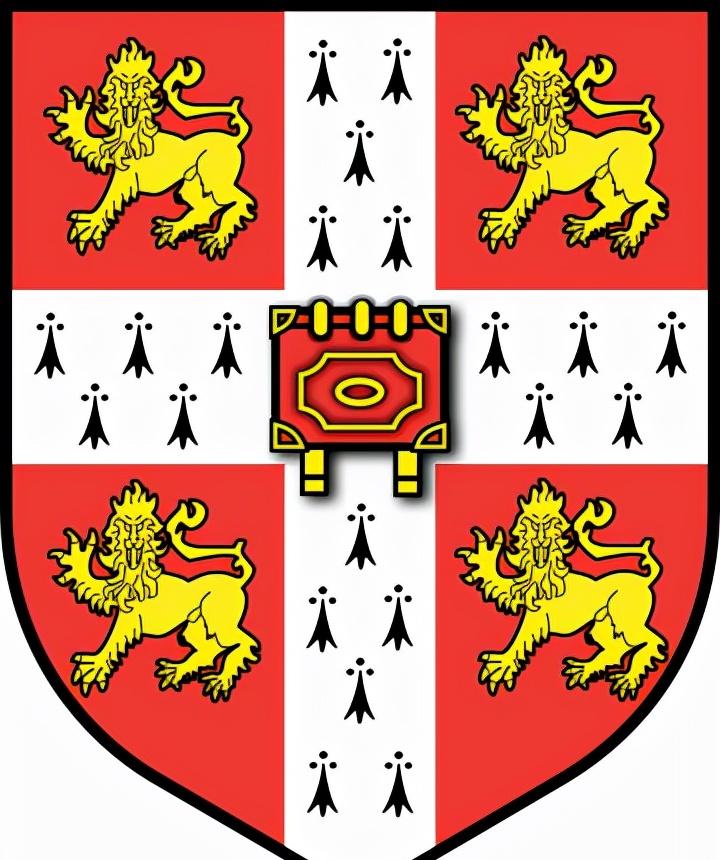College is the Adoptive Mother: The Latin School Motto of the University of Cambridge
Qing Chen, Doctor of Laws

Coat of arms of the University of Cambridge
1 About the Cambridge University Motto
The Motto of the University of Cambridge is not written in English, but is expressed in Latin:
Hinc lucem et pocula sacra (Cambridge University)
= Here [Hinc] drinks the [lucem] and the [et] fills the Holy Grail [pocula sacra]. (Translated by Dr. Chen Qing)
= This place is the source of enlightenment and the place of wisdom (traditional Chinese translation)
=[From] here [we receive] light and sacred draughts(英译法一)
=From this place, we gain enlightenment and precious knowledge(英译法二)
(English to French source: https://www.cam.ac.uk/brand-resources/about-the-logo/the-coat-of-arms)
2 Sources about Hinoc lucem et pocula sacra
According to research, the Latin motto of the University of Cambridge, Hick lucem et pocula sacra, first appeared in the following emblem used by cambridge university press in 1600.
Emblem of Cambridge University Press
There is a statue in the middle of the above-mentioned emblem, and the inscription on the base of the statue is ALMA MATER CANTABRIGIA.
ALMA MATER originally means "adoptive mother", CANTABRIGIA means "Cambridge", ALMA MATER CANTABRIGIA originally means "adoptive mother Cambridge", and the figurative meaning is "alma mater Cambridge".
Because in the eyes of Westerners, universities are alma maters.
The Latin word that surrounds the statue is Hick lucem et pocula sacra.
3 About the translation of pocula sacra
At present, the two mainstream English translations are sacred draughts and precious knowledge. Both translations are paraphrasing. The central word for pocula sacra is pocula, which originally means "cups" as an object, while sacra is a qualifier meaning "sacred", so the literal translation of pocula sacra is "holy cups" or "sacred cups", that is, "holy grail". The English poet Michael Drayton (1563–1631) described Cambridge (the twenty-first song) in his long poem Poly-Olbion, published in 1622:
A verse describing Cambridge
(摘自:E. E. Kellett, A Book of Cambridge Verse, Cambridge: Cambridge University Press, 1911, p.34.)
where the a cup in "Whose one hand holds a cup, the other bears a light" corresponds to the pocula in Hinoc lucem et pocula sacra, and a light corresponds to lucem. The line tells us that, in its original sense, the pocula sacra in Hinc lucem et pocula sacra refers to the "Holy Grail."
4 Bingelucem et pocula sacra contains verbs
Cambridge Motto Hick lucem et pocula sacra is an omitted structure, Hinc is an adjective, meaning "here" or "here", metaphorically referring to "at Cambridge University", lucem (light) is binge, as object, et is a juxtaposition conjunction, pocula sacra (holy grail) is also binge, also as an object. This structure means that if lucem et pocula sacra (light and holy grail) is regarded as a single object, then the sentence omits a transitive verb. If lucem (light) and pocula sacra (holy grail) are understood separately as two objects, then this Latin school motto omits two transitive verbs.
What verbs are omitted?
The 17th-century Archbishop Robert Leighton (1611 – 25 June 1684) gave a clue:
Hinc lucem haurire est et pocula sacra replere.
=Hence light we draw, and fill the sacred cup.
Archbishop Robert Layton's explanation of the Light and the Holy Grail
(Henry Paine Stokes, Ceremonies of the University of Cambridge,Cambridge: Cambridge University Press, 1928, p.82.)
Following this thread, we will find:
Hinc lucem et pocula sacra
=Hinc lucem haurire et pocula sacra replere.
= Here [Hinc] drinks [lucem][et] and fills the Holy Grail [pocula sacra].
Haurire originally means "drinking", lucem haurire means "drinking light", which I literally translate as "drinking light".
Replere originally means "full" and "filled", pocula sacra replere means "filled with holy grail", which I literally translate as "filling the holy grail".
The following is my personal interpretation. The so-called "lucem" is a metaphor for the "soul" of the person who is the "image" of the Creator to be nourished by the light of life. Therefore, the official English translation of Cambridge translates "lucem" as gain enlightenment. The so-called "pocula sacra" is a metaphor for the "soul" of the person who is "image" of the Creator. Since this state of fullness is embodied in the acquisition of knowledge, the official English translation of the University of Cambridge translates "pocula sacra" as (gain) ... precious knowledge。
October 19, 2021
Written in Beibei, Chongqing
Clare College, Cambridge (left) and The Chapel at King's College (centre)